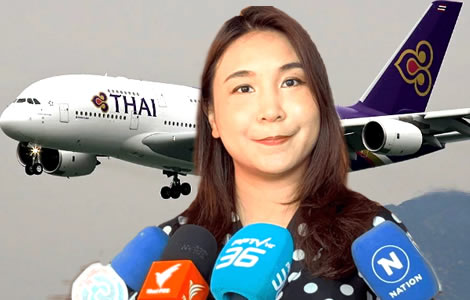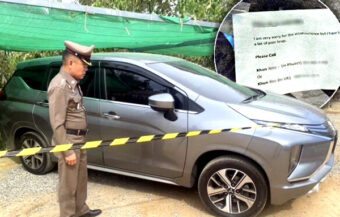People’s Party MP raises alarm over gov’t intentions for Thai Airways. Concern mounts as gov’t seeks added seats on rehab panel, sparking fears of state control as airline nears 2025 relisting. Thai Airways CEO affirms it is focused on being a commercially driven public company.
People’s Party economic spokesperson Sirikanya Tansakul has raised questions about the government’s intentions regarding Thai Airways. On Tuesday, in a social media post, Ms. Sirikanya questioned the government’s plans to install two further members on a rehabilitation committee tasked with oversight of the airline’s rehabilitation plan, which is expected to be concluded in 2025. The opposition MP questioned whether this represented a move by the state to become more involved in the former state enterprise. Certainly, in recent statements, Thai Airways CEO Chai Eamsiri has emphasised that the airline’s future is as a commercially driven public company, not as a state enterprise.

The People’s Party economic spokesperson in parliament is airing concerns about the government’s plans for Thai Airways. Certainly, the airline has reported drastically improved fortunes in the last twelve months.
Indeed, it is planning to relist on the Thailand Stock Exchange (SET) in 2025. However, Ms. Sirikanya Tansakul, MP, is concerned that the government is effectively planning to bring the former state airline under its control.
Ms. Sirikanya suggested that state control over the airline was previously linked to its decline. Writing on social media on Tuesday, she questioned whether it was fair and proper for the state to exercise control over the national flag carrier.
Government’s potential plans for control of Thai Airways sparks questions from People’s Party spokesperson
“The government plans to take over Thai Airways after it has returned to continuous profit, even though it will not return to being a state enterprise. It will send two more executives to the rehabilitation plan to hold the majority and buy additional shares with full rights, even though the revenue collection has not reached the target,” she wrote.
Undoubtedly, the Thai state remains a significant shareholder in the now highly profitable enterprise. Following the completion of the rehabilitation plan under the guidance of the Bankruptcy Court, the treasury is expected to hold 33% of the shares.
In the coming days, a vote will take place to approve the final stage of the airline’s rehabilitation. In short, Ms. Sirikanya is concerned by a last-minute request from the government. It is requesting two extra seats on the committee responsible for implementing the plan. Presently, there are three seats, including one held by a representative of the government.
This representative is Mr. Pornchai Thirawet, Director of the Office of the Public Sector Development Commission. He represents the Ministry of Finance and the state’s interests. However, the government now requests that a representative from the Ministry of Transport and a second Finance Ministry official be appointed.
Government seeks additional representation in Thai Airways’ rehabilitation process, raising concerns
At the same time, it is unclear what the airline’s new management thinks of this development. Last month, the airline emphasised its new flexible management approach, designed to allow maximum commercial flexibility in responding to market demands.
Thai Airways has played a significant role in helping revive Thailand’s struggling tourism industry. For example, this week, Minister of Tourism and Sports Surawong Thienthong is in London promoting Thai tourism.
In particular, Thai Airways flights from the United Kingdom have supported Thailand’s valuable tourism market there. On Tuesday, Surawong revealed that Thailand expects 980,887 UK visitors this year. These travellers spend an average of ฿64,488 per trip, compared to the ฿47,000 that Thailand sees on average for visitors.
This week saw the return of British Airways to Bangkok, with plans to increase its services in February and March 2025.
Meanwhile, Thai Airways has confirmed that its core mission when it exits rehabilitation in 2025 is to serve travel in and out of Thailand. This is a strategically important goal for the country.
Thai Airways continues its commitment to travel growth in and out of Thailand to support national tourism
However, the latest move by the government will make many creditors of the airline uneasy. Certainly, it may also lead to conflict with the airline’s management, which requires unfettered freedom to thrive in the commercial world after 2025.
The airline saw massive cuts in staffing and resources to become profitable again. The concern, therefore, is political interference from these new appointees.
Undoubtedly, the ill-fated procurement of Airbus A340 planes by the airline some 20 years ago was a factor in the national carrier’s failure.
On Tuesday, Ms. Sirikanya called for clarity on the government’s plans regarding Thai Airways. Amid reports that the government may provide financial support, she questioned if it was also planning to purchase additional shares. Certainly, if so, she asked where this money was coming from, especially given the tight financial position facing the government right now.
Furthermore, she wished to know what the government’s goal was at this time. In short, why does it require more management involvement in the recovering airline?
Concerns mount over potential government interference in Thai Airways’ independent management post-rehab
Thai Airways will relist on the Stock Exchange of Thailand (SET) in June 2025. This decision follows a three-year restructuring effort focused on stabilising finances and expanding operations. CEO Chai Eamsiri has ambitious plans to grow the fleet, increase destinations, and make Bangkok a global hub. This move marks a new era for the airline, which aims to attract international travellers and investors.
Eamsiri emphasises that Thai Airways will not return to state enterprise status.
“No one wants Thai Airways to return to being a state enterprise,” he explained recently. He highlighted that as a public company, Thai Airways will focus on shareholder returns. State enterprises, he noted, must balance profitability with government policies, which can create conflicts. For Thai Airways, operating as a public company offers a clearer path to profitability and growth.
Thai Airways’ financial recovery over the past year has been substantial. The airline ended 2023 with ฿165.49 billion in revenue, a significant increase from ฿105.21 billion in 2022. Passenger numbers rose sharply as well, from 4.8 million in 2022 to 13.8 million in 2023.
This surge reflects both the global travel recovery and effective new business strategies. In the second quarter of 2024, profits are projected to reach ฿12.63 billion, a 15.2% increase from the previous year.
Thai Airways’ financial recovery and operational success mark promising strides ahead of SET relisting in 2025
However, challenges remain. Thai Airways currently has a negative shareholder value of ฿40.42 billion. At the same time, it holds more than ฿80 billion in cash reserves. With this financial cushion, the airline can complete its debt-to-equity restructuring plan.
The company will hold a creditors’ meeting by the end of 2024 to finalise this process. Following this, a shareholders’ meeting in April 2025 is expected to approve a new board of directors, who will guide the airline’s next steps.
Fleet expansion is a core element of Thai Airways’ growth strategy. Currently, the airline operates 77 aircraft and serves 62 destinations across 27 countries. Under its expansion plan, Thai Airways will nearly double its fleet to 143 planes.
This will include 91 wide-bodied aircraft for long-haul international flights and 52 narrow-bodied planes for regional routes. By the end of 2025, Thai Airways expects to operate 150 planes, including 98 wide-bodied jets. This expanded fleet will allow the airline to increase both the number and frequency of routes. The goal is to make Bangkok a key travel hub for global travellers.
This fleet expansion aligns with Thai Airways’ mission to serve passengers flying in and out of Thailand. “Our mission is clear,” Eamsiri said. “We are focused on serving passengers in and out of Thailand, making Bangkok a central hub.” The airline aims to be a strong competitor in the international market while prioritising growth for Thailand’s tourism and economy.
Thai Airways’ fleet expansion and strategic goals underscore Bangkok’s role as a global travel hub
Thai Airways entered bankruptcy in May 2020, seeking court protection to address significant financial challenges. Since then, it has collaborated with creditors and management experts to design a recovery plan. The final steps involve a petition to the Central Bankruptcy Court in April 2025. Once approved, Thai Airways can formally exit its rehabilitation status. The SET relisting, planned for June 2025, will mark the completion of this process.
To support the relisting, Thai Airways will issue 9.8 billion new shares. Each share is valued at no less than ฿2.542, with a total offering projected at ฿25 billion. This public offering aims to attract investors and inject new capital, strengthening the airline’s position on the stock market.
Leadership changes are expected as Thai Airways prepares for its new chapter. Eamsiri anticipates that one of the current parent company’s executives will join the board.
Shareholder offering and leadership transition expected as Thai Airways plans SET relisting by mid-2025
This appointment will help maintain continuity in leadership and ensure stability. The selection of a strong board aligns with the court-approved rehabilitation plan, which emphasises effective management to support long-term growth.
With a renewed focus on efficiency and competitiveness, Thai Airways aims to become a leading airline regionally and globally. Eamsiri remains confident in the airline’s trajectory, stating that Thai Airways is well-prepared for its future challenges.
Thai Airways to refloat on Stock Exchange in June 2025 with a renewed mission as national carrier
The airline’s return to the SET in 2025 will signal a major recovery for Thailand’s aviation industry. Investors and industry experts are closely watching Thai Airways as it works to achieve sustainable growth.
The road ahead remains demanding. Thai Airways must maintain its momentum and carefully manage its expanded fleet. Consistent performance and financial stability will be critical to its success. If it meets these goals, Thai Airways can not only secure its place in Thailand’s market but could also elevate its position as a global carrier.
Join the Thai News forum, follow Thai Examiner on Facebook here
Receive all our stories as they come out on Telegram here
Follow Thai Examiner here
Further reading:
Thai Airways to refloat on Stock Exchange in June 2025 with a renewed mission as national carrier
Passenger complaint turbulence as Thai Airways appears to plot sky-high Dreamliner expansion
Passengers to finally get refunds from high-flying Thai Airways still facing financial turbulence
Flying high at Thai Airways as numbers skyrocket as it flies tourists into the kingdom from Europe
Thai Airways seeking business rehabilitation plan that has the unanimous support of it’s creditors


















